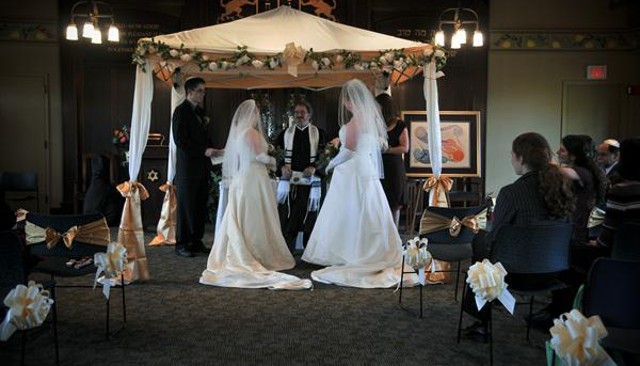Within Progressive Judaism, we start with a strong emphasis on the human position. We also believe that every human being is ‘made in God’s image’, and that God is a God of love, kindness and justice. Whilst the majority of people are predominantly heterosexual, it is clear that a significant number are not, and we do not accept that God wishes them to be forced into relationships and structures that are not as loving, healthy and supportive as they could be.
Since we believe that Torah is a revered but ultimately human document, written by our ancestors, inspired by God and seeking to answer the question ‘What does God want of us?’, we recognise the duplicated prohibition in Leviticus that ‘a man should not lie with another man as with a woman’ as one of those simplistic and time-bound human rules, developed in the context of needing to produce as many children as possible to create a numerous nation (and army) – and one that has, sadly and tragically, led to enormous prejudice, bigotry, hatred and violence against a particular group within all monotheistic religions over the subsequent millennia.
Back in Genesis 2, the observation is made, in the name of God, that a person should not be alone. However much you love your animals, they are not the same as another person. The context of the creation story on Genesis 1 is on reproduction – the trees and vegetation with their seed in them, the very first command – even before humans have been created – to the creatures and birds and insects: ‘Go forth and multiply’. When God created humanity – male and female at the same moment – they too received the same instruction – the first command to humanity, but with the added responsibility to ‘khivshuha’ – to ‘master’ or ‘care-take’ the earth. After Adam and Eve are expelled from the Garden of Eden (the naive innocence of childhood where everything is provided), they get down to propagation (chapter 4) – the explanation for the population of the world. Male and Female equals children!
So this relationship which produces children was seen as ‘God’s natural plan’ (though sometimes with more than one wife!) and was formalised in ‘marriage’ which was then seen as a ‘God given’ or ‘holy’ structure (the agreement to form such as unit is termed ‘kiddushin’, sanctification). Hence, as with homophobia, marriage as a divinely sanctioned heterosexual union has also drawn heavily on the Hebrew bible as it has become the norm in monotheism.
Today we acknowledge that we cannot be sure of God’s will, and that Torah scholarship does not spell it out definitively and fully. We view and review our generations of experience and scholarship with our wish for truth, right, justice and compassion and our understanding of psychology, history, coercion and oppression in the name of religion and God. We seek to do God’s will, as our ancestors did, but with the awareness that we may not be right, and can only do our best.
In March, 2000, the Central Conference of American Rabbis agreed that “the relationship of a Jewish, same gender couple is worthy of affirmation through appropriate Jewish ritual”. In Britain, too, homosexual Jewish couples were able to celebrate a Commitment Ceremony. In 2009, the Rabbis of the Union for Progressive Judaism (Australia, New Zealand and Asia) resolved to permit its rabbis to officiate at same gender commitment ceremonies between two Jews. At that stage we were not ready to use the specific term Kiddushin but could use the term ‘bestowing Kedusha’. A document may be used and referred to as a Ketubah. A Khuppah may be used as it may be understood to represent the Jewish home being established.
We have agreed not to call the ceremony Marriage for the time being even where we may be legally entitled to do so, but we have written to the government to call for full Marriage Equality – so that marriage may now be recognized as a binding legal and social commitment between two adults. Marriage serves as a recognised and long-term legal and social structure in the modern world. Those who live in a permanent relationship without the benefit of the formal recognition may still suffer from some social stigma and may be disadvantaged, for example in pension rights, and any such inequity is unjust and unacceptable. For these reasons, the Rabbis and leaders of the UPJ now wish to see marriage redefined as the permanent and exclusive relationship between two people, whether a man and a woman, two women or two men, and support Marriage Equality. We were the only religious group to provide supportive testimony to the two Parliamentary enquiries into it, but hope that others will soon join us! We also support Keshet (keshet.org.au), who are committed to challenging the ongoing prejudice and discrimination within the Jewish community against homosexuality.
Author: Rabbi Johnathon Keren-Black
Publication: Galus Australis
Date: 24 July 2013

